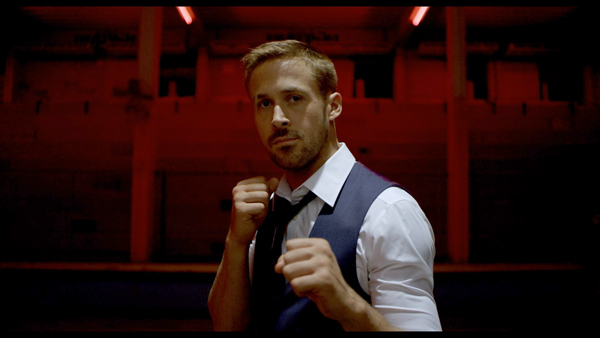In the seedy underbelly of Bangkok, Billy (Tom Burke), a calm but salacious American, pays for a 14-year-old prostitute and rapes and kills her. He’s caught by Chang, a retired police chief (though his job is never quite clear, at least to me), who commands the girl’s pimp/father to beat Billy to death. Then to punish the grieving man for killing Billy so willingly, as well as for forcing his daughter into prostitution, Chang cuts off an arm of Billy’s killer. Meanwhile, Billy’s mother, Crystal (Kristin Scott Thomas), arrives to claim her son’s body. She swears vengeance for her son’s murder, but what about her other son, Julian, also in Bangkok selling drugs and hanging around a kickboxing gym? Can he avenge his brother? Does he even want to? Does he have a pulse?
I didn’t expect Nicolas Winding Refn’s follow-up to Drive would be like that film, and his career has certainly varied—from the interesting (and better as it went along) Pusher trilogy to the quirky Bronson to Valhalla Rising. He doesn’t quite make the same movie twice, though they’re all characterized by macho bravado and an artist’s eye for ultra-violence (remember what happened to Christina Hendricks in Drive?) But with Only God Forgives, I’m not sure what he was trying to accomplish except to tell the most grisly and nihilistic of revenge stories. And there are a LOT of those kinds of films out there, so in order to break off from the pack, you got to try something different. Refn’s decision is to make it as restrained in most respects, like a Robert Bresson film, even in some (though certainly not all) of his violent set pieces .
Most scenes are completely monotone, as if the entire world has been drained of emotion or kicked in the teeth. When and where do characters talk like this? The actor playing Chang, Vithaya Pansringarm, is especially frustrating in this regard. Perhaps he’s supposed to come off like the ultimate bad ass/villain. Chang may have more scruples than other characters. (Look, he has a granddaughter, isn’t that nice? She’ll come back later in the story I bet.) Yet even with an inkling of a screen presence, he never comes alive. He blends in with the rest of the scenery, often walking like a drone through the streets of Bangkok.
In fact, it seems like most of the characters are under some sort of trance, like they’ve been hypnotized by Refn a la Herzog’s Heart of Glass. Ryan Gosling especially underwhelms. His character, Julian, is supposedly haunted by past crimes. Hence, he’s living in Bangkok. (Why his brother is there, I dunno. Who needs explanation in the world of prettily shot colors?) But this explanation comes way too late, and even if Julian’s meant to be a tragic figure, he is just too placid, too calm and immovable to become a tragic figure. His performance is all surface, and one starts to wonder if there is anything under there. And it’s not like Gosling can’t project screen presence—see Drive, where he was subdued but always intriguing in a way that can’t be explained, or The Place Beyond the Pines—but when he’s given nothing to do, it shows.
Is God Only Forgives an auteurist bust? Somewhat. But there are things to recommend it, if one is already planning on seeing it, even though in terms of story and most of the acting it’s a slog of pointless staring and gratuitous violence. (Yes, some scenes just went too far even for me—one torturous scene goes to Saw levels of voyeuristic decay.) It must be said that among all the performers, Kristin Scott Thomas stands out. She looks like she has come in from another movie—and the movie’s all the better for it. Her dialog is scathing but funny, and it suddenly livens up an otherwise dour film with color and trashy excess. Even her clothes and make-up are excessive.
The other merit, simply on aesthetic grounds, is the cinematography. Thanks to Larry Smith, this is a wonderful film to look at. He took care to make this dark but neon-lit story look just that, dark and neon lit. One can still admire the compositions and lighting, and it’s always striking, eerie, and intense. And I must come clean: one scene, if only out of context, is exciting and engaging—when Julian challenges Chang to a fight. The soundtrack kicks into an ’80’s synth score, and the fight is choreographed and shot with flair and panache. You can feel every punch and kick and move thrown. If only that sequence, Scott Thomas, and the cinematographer had been in a movie with a director whose head was on right and had a little, I don’t know, fun.

















Leave A Comment